Reading is a fundamental skill that forms the cornerstone of education. As educators, one of our primary objectives is to nurture this skill in our students. To do that effectively, we must have tools at our disposal to assess and track their progress. Fortunately, technology has provided us with a plethora of reading assessment software options that make this task not only easier but also more insightful.
In post, we’ll explore the world of reading assessment software, examining its importance, the benefits it offers, criteria for selecting the right tool, and a selection of seven of the best reading assessment software options available to teachers today. Whether you’re a classroom teacher, a reading specialist, or an education professional, these tools can enhance your teaching and assessment capabilities.
Understanding Reading Assessment
Before delving into the world of reading assessment software, it’s essential to understand the fundamentals of reading assessment itself.
The Purpose of Reading Assessment: Reading assessments serve multiple purposes in education. They help educators evaluate students’ reading abilities, identify areas of strength and weakness, and tailor instruction to meet individual needs. Additionally, reading assessments inform decisions about curriculum development, resource allocation, and program effectiveness.
Just so you know
With OnlineExamMaker quiz software, anyone can create & share professional online assessments easily.
Types of Reading Assessments: Reading assessments can be broadly categorized into three main types: formative, summative, and diagnostic.
1. Formative Assessment: This type of assessment occurs during the learning process, providing ongoing feedback to both teachers and students. Formative assessments, such as quizzes or classroom discussions, help instructors adjust instruction to better meet student needs.
2. Summative Assessment: Summative assessments are typically end-of-term or end-of-year evaluations. They gauge overall student performance and are often used for grading purposes. Standardized tests fall into this category.
3. Diagnostic Assessment: Diagnostic assessments are used to identify specific areas of difficulty or learning gaps in individual students. These assessments inform targeted intervention strategies.
Key Components of Effective Reading Assessment: Effective reading assessments share several key components, including:
Alignment with Learning Goals: Assessments should align with specific learning objectives and curriculum standards.
Validity and Reliability: Assessments must be valid, measuring what they intend to measure, and reliable, consistently producing consistent results.
Diverse Assessment Methods: A variety of assessment methods, such as oral reading, written comprehension, and vocabulary assessments, ensure a comprehensive evaluation of reading skills.
Timely and Actionable Feedback: Assessments should provide timely feedback that allows for adjustments in instruction.
Benefits of Reading Assessment Software
Reading assessment software offers several advantages that make it an invaluable tool for educators.
Efficiency and Time-Saving: Software streamlines the assessment process, reducing the time spent on test administration, grading, and data analysis.
Personalization of Assessments: Many reading assessment software tools allow educators to create customized assessments tailored to individual student needs.
Real-Time Data Analysis: Software provides immediate feedback and data analysis, enabling educators to make informed instructional decisions.
Adaptability to Diverse Student Needs: Reading assessment software can accommodate students with various learning styles, levels, and needs, making it a versatile tool in diverse classrooms.
Criteria for Selecting Reading Assessment Software
Choosing the right reading assessment software is crucial. Consider the following criteria when evaluating potential options:
Accessibility and User-Friendliness: The software should be user-friendly for both educators and students, with accessible interfaces and clear instructions.
Data Security and Privacy: Ensure that the software complies with data security and privacy regulations, safeguarding student information.
Reporting and Analytics Capabilities: Effective software should provide detailed reports and analytics to help educators identify areas of improvement and track student progress.
7 of the Best Reading Assessment Software
1. OnlineExamMaker
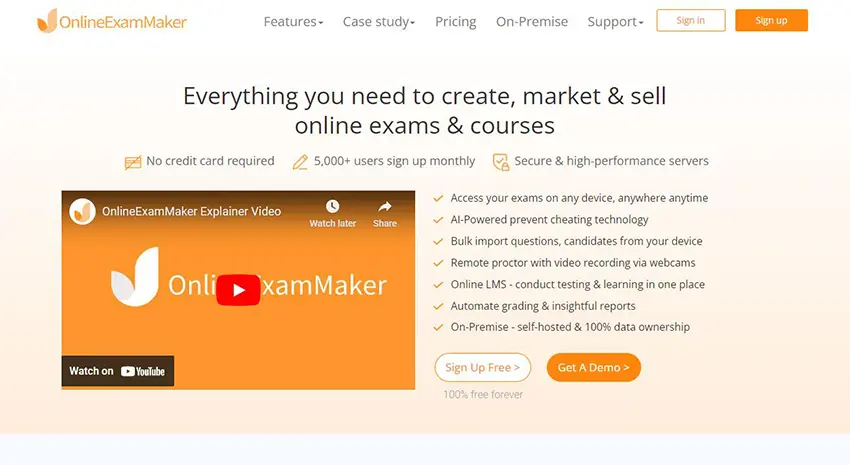
OnlineExamMaker is a powerful reading assessment tool designed to provide educators with a comprehensive view of student reading skills. It offers a wide range of assessment types, including vocabulary assessments, fluency assessments, and comprehension tests. The software’s user-friendly interface makes it accessible for both teachers and students.
Key Features and Functionalities:
✔ Mobile-friendly design for learning on the go.
✔ Real-time scoring and feedback for immediate insights.
✔ Adaptive assessments that adjust difficulty based on student performance.
✔ Integration with popular learning management systems (LMS).
✔ Detailed analytics and progress tracking tools.
✔ Social learning features for peer interaction and knowledge sharing.
✔ Single sign-on (SSO) integration for seamless user authentication.
Pricing Information: Free to use. If you want to use advanced face recognition function, you need to purchase the extra service.
Create Your Next Quiz/Exam with OnlineExamMaker
2. ClassMarker
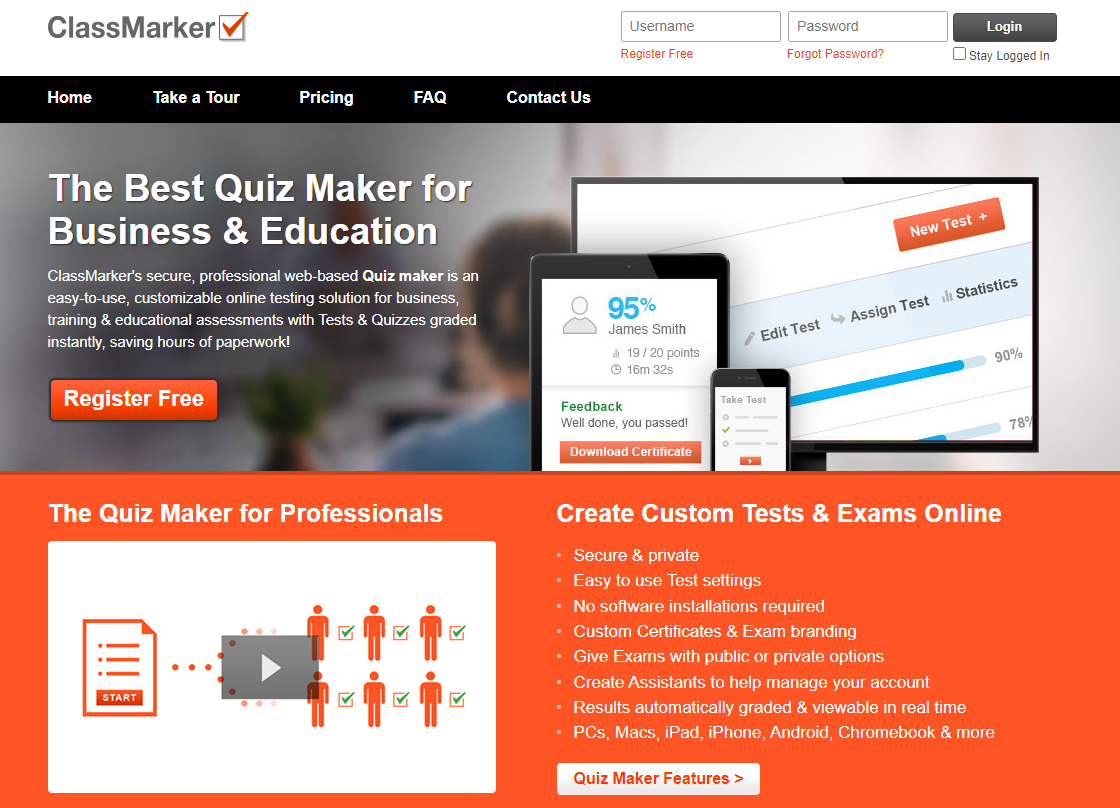
ClassMarker is a versatile reading assessment platform that caters to educators at all levels. The software offers a rich library of pre-built assessments and the option to create custom assessments tailored to individual student needs.
Key Features and Functionalities:
✔ Custom assessment creation with a user-friendly interface.
✔ Automated scoring and detailed performance reports.
✔ Support for collaborative assessment creation.
✔ Customizable branding options for personalized assessments.
✔ Flexible question types including multiple-choice, essay, and file upload.
Pricing Information: ClassMarker Offers a free plan with limited features for up to 10 users. Paid plans start at $39.95 per month for the Basic plan.
3. Flexiquiz

Flexiquiz is a renowned reading assessment tool trusted by educators worldwide. It offers a comprehensive suite of reading assessments, including phonics assessments, reading fluency tests, and reading comprehension assessments.
The software is known for its adaptability to various instructional settings. Whether you’re an educator looking to enhance student learning, a corporate trainer seeking to evaluate employee knowledge, or an event organizer looking to gather feedback, Flexiquiz is your go-to solution.
Key Features and Functionalities:
✔ Diverse assessment types suitable for all reading levels.
✔ Real-time scoring and performance analytics.
✔ Alignment with educational standards.
✔ Integration with popular learning management systems.
✔ Secure and compliant with data privacy regulations.
Pricing Information: Flexiquiz offers a range of plans starting from around $17 per month for their Essentials plan, up to approximately $60 per month for their Enterprise plan.
4. Classtime
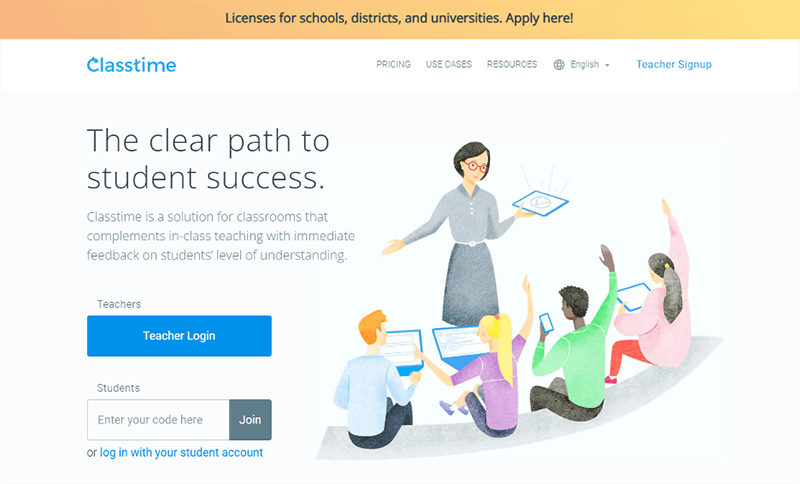
Classtime is a user-friendly reading assessment platform designed for educators seeking quick and reliable assessments.
Designed to enhance student participation and teacher effectiveness, Classtime leverages technology to create a collaborative and engaging educational environment. It offers pre-made reading quizzes and the option to create customized assessments. The platform prioritizes ease of use.
Key Features and Functionalities:
✔ Pre-made reading quizzes for various reading levels.
✔ Custom assessment creation with a simple interface.
✔ Immediate scoring and feedback for educators and students.
✔ Integration with leading learning management systems.
✔ Cost-effective pricing options.
Pricing Information: Free demo, paid plans.
5. TestInvite
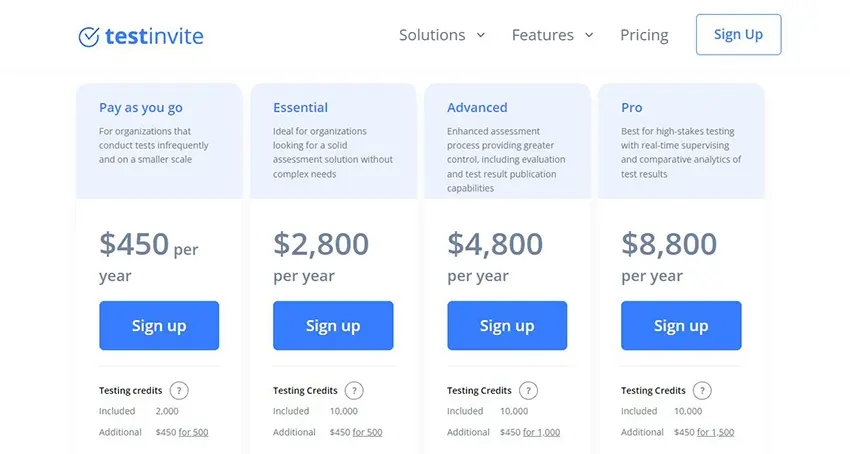
TestInvite is a versatile reading assessment tool designed to accommodate the unique needs of diverse learners. It offers adaptive assessments that adjust to individual reading levels and provide targeted feedback.
With its user-friendly interface and robust features, TestInvite empowers recruiters, educators, and HR professionals to efficiently manage and administer assessments, saving time and resources while ensuring accurate evaluation of candidates and learners.
Key Features and Functionalities:
✔ Adaptive assessments tailored to each student’s reading level.
✔ Comprehensive reading skill evaluation, including phonics and comprehension.
✔ Data-rich reporting for educators to track student progress.
✔ Seamless integration with popular learning management systems.
✔ Compliance with data privacy regulations.
Pricing Information: TestInvite provides free, Basic, Essential, and Advanced plans, prices rang from $37.5 to $159 per month, which are suitable to individual recruiters, educational institutions, and businesses of all sizes.
6. eDoctrina

eDoctrina is an innovative reading assessment platform that emphasizes engagement and personalized learning. It offers interactive assessments that adapt to student responses, ensuring a dynamic and effective assessment experience.
Key Features and Functionalities:
✔ Interactive assessments that adjust based on student performance.
✔ Comprehensive evaluation of reading skills, including vocabulary and fluency.
✔ Engaging content and multimedia elements to enhance assessments.
✔ Integration with leading learning management systems.
✔ Robust reporting and analytics tools.
7. ThinkExam
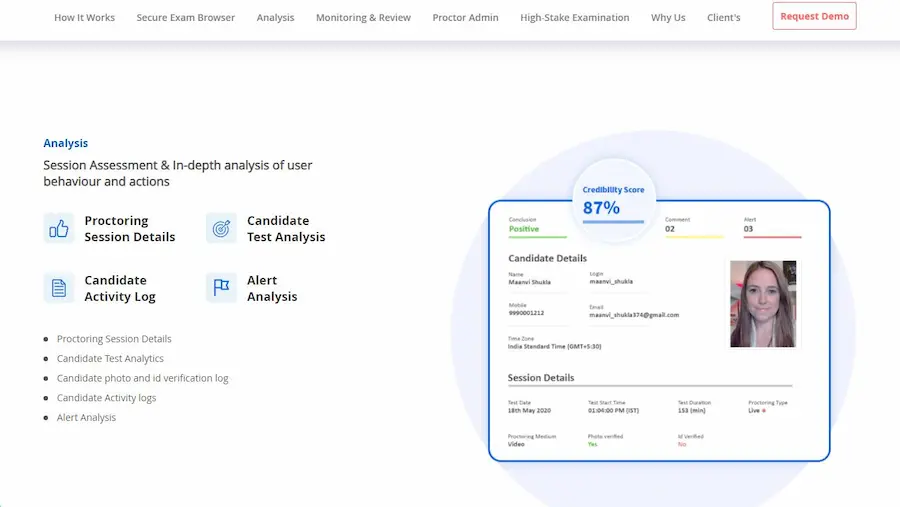
ThinkExam is a user-friendly reading assessment platform designed for educators who prioritize simplicity and efficiency. It offers a variety of pre-made assessments and the ability to create customized quizzes.
ThinkExam provides an extensive range of question types, allowing users to create diverse and engaging tests. It supports multimedia-rich questions, including images, audio, and video, enhancing the assessment experience. With advanced anti-cheating measures, ThinkExam ensures the integrity of exams. It incorporates features such as live video monitoring, AI-based facial recognition, screen recording, and browser lockdown to prevent malpractices.
Key Features and Functionalities:
✔ Secure online proctoring with advanced anti-cheating measures.
✔ Customizable assessments with personalized test templates.
✔ Adaptive testing based on individual capabilities.
✔ Automated grading for efficient evaluation.
✔ Multimedia-rich questions with images, audio, and video support.
✔ Real-time monitoring of exams through live video monitoring.
✔ AI-based facial recognition for enhanced security.
✔ Screen recording to prevent unauthorized activities.
Pricing Information: ThinkExam offers a free trial to experience the platform. You need to contact them directly for a quote.
Conclusion
Reading assessment is a vital component of effective literacy instruction. The availability of reading assessment software empowers educators to assess student reading skills efficiently, personalize instruction, and track progress. The seven software options highlighted in this article offer diverse features and cater to various educational needs.
As you explore these tools, consider your specific teaching context, the needs of your students, and your budget. Remember that the right reading assessment software can be a valuable asset in your quest to nurture proficient readers and provide quality education. Embrace the possibilities of technology to enhance your teaching and assessment capabilities, ultimately benefiting your students and fostering a love for reading.